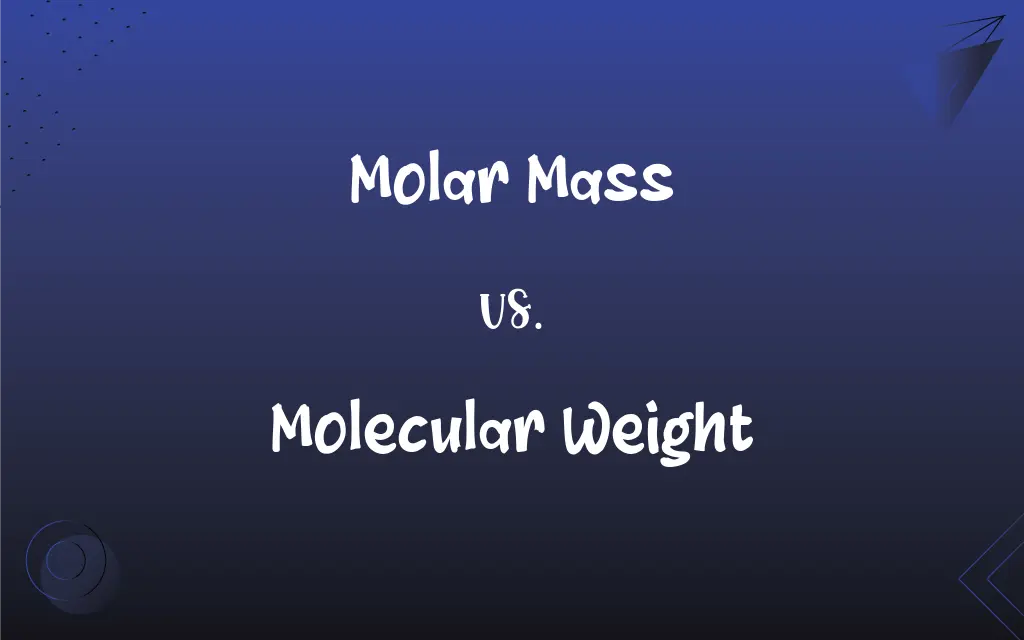Molar Mass vs. Molecular Weight: What's the Difference?
Edited by Aimie Carlson || By Harlon Moss || Published on January 14, 2024
Molar Mass is the mass of one mole of a substance, measured in grams per mole (g/mol). Molecular Weight is the sum of the atomic weights of atoms in a molecule, measured in atomic mass units (amu).

Key Differences
Molar mass refers to the mass of one mole of a substance, usually expressed in grams per mole, making it a critical value in chemical calculations. Molecular weight, on the other hand, is the total atomic mass of all the atoms in a molecule and is typically expressed in atomic mass units (amu) or Daltons (Da).
In practical chemistry, molar mass is used to convert between moles and grams in chemical reactions, serving as a bridge between the macroscopic and microscopic world. Molecular weight is more theoretical, often used to calculate molecular formulas and in stoichiometry.
Molar mass is calculated by adding the atomic masses of all the atoms in a compound and then expressing it in g/mol. Molecular weight is also calculated by summing atomic weights, but the value remains unitless or in atomic mass units, reflecting the relative mass of molecules.
Molar mass is essential for practical laboratory work, particularly in measuring quantities for reactions. Molecular weight, while closely related, is more used in theoretical aspects of chemistry, such as understanding molecular structure and composition.
When dealing with solutions, molar mass is crucial for calculating molarity, which is moles of solute per liter of solution. Molecular weight aids in understanding the molecular size and composition, useful in molecular biology and biochemistry.
ADVERTISEMENT
Comparison Chart
Units of Measurement
Grams per mole (g/mol)
Atomic mass units (amu) or Daltons (Da)
Role in Chemistry
Converts between moles and grams
Calculates molecular formulas, used in stoichiometry
Calculation Method
Sum of atomic masses, expressed in g/mol
Sum of atomic weights, unitless or in amu
Application
Practical laboratory work, molarity calculations
Theoretical chemistry, molecular structure analysis
Importance
Essential in quantifying substances for reactions
Important for understanding molecular size and composition
ADVERTISEMENT
Molar Mass and Molecular Weight Definitions
Molar Mass
Molar mass is the mass of one mole of a substance.
The molar mass of water (H2O) is approximately 18 g/mol.
Molecular Weight
Molecular weight is important in molecular formula calculations.
Determining the molecular weight of a compound helps in its structural analysis.
Molar Mass
Molar mass is key in calculating molarity.
To prepare a 1 M solution of NaCl, use its molar mass to measure out 58.44 g.
Molecular Weight
It's measured in atomic mass units (amu) or Daltons.
Benzene's molecular weight is about 78 amu.
Molar Mass
It's used in stoichiometry for balancing chemical equations.
Knowing the molar mass of reactants helps in predicting product amounts.
Molecular Weight
Molecular weight is the sum of the atomic weights of all atoms in a molecule.
The molecular weight of glucose (C6H12O6) is 180 amu.
Molar Mass
It's expressed in grams per mole (g/mol).
To calculate the mass of a mole of carbon dioxide, use its molar mass of 44.01 g/mol.
Molecular Weight
It reflects the relative mass of molecules.
A higher molecular weight indicates a larger or more complex molecule.
Molar Mass
Molar mass is derived from the periodic table.
The molar mass of sodium chloride is the sum of the masses of sodium and chlorine.
Molecular Weight
Molecular weight aids in understanding molecular size and composition.
Molecular weight is crucial in protein and DNA research.
Molecular Weight
Alternative spelling of molecular weight
FAQs
What is molar mass?
The mass of one mole of a substance, in grams per mole.
How is molecular weight calculated?
By adding the atomic weights of all atoms in a molecule.
Why is molar mass important in chemistry?
It's crucial for converting between moles and grams in reactions.
How is molar mass calculated?
By summing the atomic masses of a compound's elements.
Can molecular weight be used to determine molecular size?
Yes, it indicates the relative size of molecules.
Is molar mass used in stoichiometry?
Yes, it's vital for balancing chemical equations.
What is molecular weight?
The total atomic weight of all atoms in a molecule.
Are molar mass and molecular weight the same?
They're related but differ in units and application.
What role does molecular weight play in science?
It helps in understanding molecular size and structure.
What unit is molar mass expressed in?
Grams per mole (g/mol).
Is molar mass important for making solutions?
Yes, especially for calculating molarity.
Is molecular weight important in drug design?
Yes, for understanding drug molecules' size and properties.
Do chemists use both molar mass and molecular weight?
Yes, both are essential in different chemical contexts.
Can molar mass be used in calculating reaction yields?
Yes, it's crucial for predicting product amounts.
Does molecular weight affect a molecule's physical properties?
Yes, like boiling and melting points.
Does molar mass vary with temperature?
No, it's a constant value for each substance.
What unit is molecular weight expressed in?
Atomic mass units (amu) or Daltons.
Does molecular weight vary between isotopes?
Yes, due to differences in atomic weights.
How does molecular weight aid in molecular biology?
It helps in analyzing proteins and nucleic acids.
Can molar mass be used in gas law calculations?
Yes, in laws involving moles and gas volumes.
About Author
Written by
Harlon MossHarlon is a seasoned quality moderator and accomplished content writer for Difference Wiki. An alumnus of the prestigious University of California, he earned his degree in Computer Science. Leveraging his academic background, Harlon brings a meticulous and informed perspective to his work, ensuring content accuracy and excellence.
Edited by
Aimie CarlsonAimie Carlson, holding a master's degree in English literature, is a fervent English language enthusiast. She lends her writing talents to Difference Wiki, a prominent website that specializes in comparisons, offering readers insightful analyses that both captivate and inform.






































































